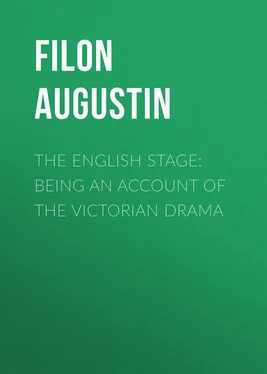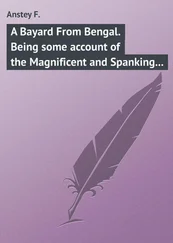Augustin Filon - The English Stage - Being an Account of the Victorian Drama
Здесь есть возможность читать онлайн «Augustin Filon - The English Stage - Being an Account of the Victorian Drama» — ознакомительный отрывок электронной книги совершенно бесплатно, а после прочтения отрывка купить полную версию. В некоторых случаях можно слушать аудио, скачать через торрент в формате fb2 и присутствует краткое содержание. Жанр: foreign_antique, foreign_prose, foreign_language, short_story, на английском языке. Описание произведения, (предисловие) а так же отзывы посетителей доступны на портале библиотеки ЛибКат.
- Название:The English Stage: Being an Account of the Victorian Drama
- Автор:
- Жанр:
- Год:неизвестен
- ISBN:нет данных
- Рейтинг книги:4 / 5. Голосов: 1
-
Избранное:Добавить в избранное
- Отзывы:
-
Ваша оценка:
- 80
- 1
- 2
- 3
- 4
- 5
The English Stage: Being an Account of the Victorian Drama: краткое содержание, описание и аннотация
Предлагаем к чтению аннотацию, описание, краткое содержание или предисловие (зависит от того, что написал сам автор книги «The English Stage: Being an Account of the Victorian Drama»). Если вы не нашли необходимую информацию о книге — напишите в комментариях, мы постараемся отыскать её.
The English Stage: Being an Account of the Victorian Drama — читать онлайн ознакомительный отрывок
Ниже представлен текст книги, разбитый по страницам. Система сохранения места последней прочитанной страницы, позволяет с удобством читать онлайн бесплатно книгу «The English Stage: Being an Account of the Victorian Drama», без необходимости каждый раз заново искать на чём Вы остановились. Поставьте закладку, и сможете в любой момент перейти на страницу, на которой закончили чтение.
Интервал:
Закладка:
There are, in the England of to-day, two schools of dramatic criticism, whose divergence of opinion is clearly marked. They are called “New Critics” and “Old Critics,” though accidents of date or age are hardly at all accountable for their antagonisms; it is possible that during the next few years the old criticism may become rejuvenated and that the new criticism may age. For my part, I have sided with neither the one nor the other, because the rôle of neutral is best suited to a foreigner. I have supplemented my own personal impressions by quotations, taken impartially from both camps, of what has struck me in their criticisms as noteworthy, or happy, or true. I think that the new school is right in wishing to free the English theatre from foreign influences, and in its efforts to give the drama a moral value and an ideal. But I think the old school is not far wrong when it defends, to a certain extent, the more popular forms of dramatic art, and when it would have the drama follow the indications of success, and not isolate itself from that public of whose feelings it should be the living expression.
One word in conclusion. Among the French critics who have done me the honour of discussing my work during its serial publication, more than one has come to the conclusion that, after all, these new English dramas were not such great affairs, and that it was hardly worth while to make so much fuss about them. They forget, these good people, that I promised them no marvels; I did not invite them to a display of masterpieces. If there are to be masterpieces at all, they will be of to-morrow, not to-day. What I have set out to do is to ascertain at what temperature the drama comes to flower, to see how a great section of the human race sets about making to itself a new vehicle of enjoyment, of emotion, of thought, and, I may even add, of moral education. It is an essay in literary history, but also in social history. The two things go together, – are, indeed, henceforth inseparable.
I do not merely follow, step by step, the gradual transformation of the theatrical world; I have endeavoured to make clear the attitude taken up by the drama in presence of the crisis through which society has been passing during the last score or so of years. In this strange conflict between laws and manners, upon which side will the drama definitively take up its stand? What part will it play, and what place will it assume, in the renovation of England by the democracy? Will it help democracy with earnest homilies? Or check it with satire and ridicule? Or will it turn aside from such things altogether, and aspire to those serene heights of art, to which the noises of the plain can never reach? The secret of its downfall or glory lies perhaps in the answering of these questions. It was time to submit them, pending the hour of their solution.
CHAPTER I
A Glance back – From 1820 to 1830 – Kean and Macready – The Strolling Player – The Critics – Sheridan Knowles and Virginius – Douglas Jerrold – His Comedies — The Rent Day — The Prisoner of War — Black-eyed Susan – Collapse of the Privileged Theatres – Men of Letters come to the Rescue of the Drama – Bulwer Lytton — The Lady of Lyons — Richelieu — Money .
From 1820 to 1830 the Theatre, or, to be precise, the theatres, prospered to all appearances exceedingly. We shall see just now the real significance of this prosperity; it may be compared to the great ball given by Mercadet on the eve of his bankruptcy. But no one foresaw the collapse that was impending. It was the reign of the Adonis of sixty, who had spent his life inventing pomades and breaking oaths. It would have been droll, indeed, had the man who washed his dirty linen in the House of Lords pretended to be scandalised by the licence of the stage. And his heir, also a worn-out man of pleasure, had lived for a time with an actress, Mrs. Jordan, who, before his accession to the throne, died of grief, and forsaken, at St. Cloud. The small girl named Victoria, who roamed at this time amongst the lonely avenues of the old park at Broadstairs, and who was destined presently to bring marital love and the domestic virtues back into fashion, was still engrossed in the minding of her dolls.
The “privileged” theatres were frequented, or patronised, – to use the recognised English expression, with its savour of old-time condescension, – by Society. By the term “privileged,” subventioned must not be understood. To Drury Lane and Covent Garden alone belonged the right of producing the legitimate drama, the plays of Shakespeare, that is to say, and of his successors. This was their “privilege,” a privilege which might soon have become but a doubtful benefit had not great actors arisen to keep alive the classical drama by their command on the suffrages of the masses. The generation of actors who had studied in the school of Garrick, and had maintained its traditions, was taking its farewell of the stage in the person of John Kemble and Mrs. Siddons – Siddons, “whose voice,” one of her contemporaries tells us, “was more delicious than the most delicious music.” Edmund Kean had already come forward, and after him, Macready.
I try to picture to myself these two men as they appeared upon the stage, to produce for myself from all the accounts of them that I have read the illusion of their living presence. The first thing that comes home to one is Kean’s Bohemianism, Macready’s respectability and good-breeding. Macready was the friend of the leading men of letters of his time, and had the advantage of their advice and support. Kean’s only intimate was the brandy-bottle that killed him. Writing to Frederick Yates, the manager of the Adelphi, to ask him for a box, he says, “I don’t want to herd with the mob. I like the money of the public, but the public itself I scorn.” He in his turn might be looked upon with scorn, were it not for the sufferings of his childhood and youth. If ever man had the right to hate life, it was he.
At Madame Tussaud’s the two rivals may now be seen standing side by side, Kean wearing the kilt of Macbeth and Macready the chlamys of Coriolanus. Save for his small size, the former seems the better endowed by nature; his countenance is sombre and bears the stamp of the tragedian. The angular and wrinkled face of Macready, on the other hand, – his slitlike mouth, his close-compressed lips and projecting jaws, – might have made the fortune of a clown. He had only to emphasise or modify its effects, indeed, for his tragic qualities to become comic. It was thus that he rendered so admirably the officiousness and fussiness of Oakley, the sly sensuality of Joseph Surface, the English Tartufe. Alas! he evoked a smile sometimes as Othello; when the Moorish condottiere , this personification of a passionate, noble, and high-strung race, was lost in an insensate negro or, if Théophile Gautier were to be believed, something lower still, “an anthropoid ape.”
Contemporaries seem agreed in attributing to Kean more genius, more talent to Macready. But there are many occasions when talent serves better than genius. To see Kean, said Coleridge, was to read Shakespeare by flashes of lightning. It is a method which has its merits, but by it one misses a good deal. Kean had some wonderful moments, then relapsed into dulness and insignificance. He would stumble, like a schoolboy reciting a lesson which had no meaning for him, through the whole of the speech of the Moor of Venice before the Senate, “letting himself go” only in the last verse, in which his emotion on seeing Desdemona brought down the house. He concentrated a whole passion into these final words. It was always thus with him.
I may say of them, following Mr. Archer: of the two, Kean was the greater actor and Macready the greater artist. Everything that pertained to instinct was stronger in the one, and everything that pertained to intellect was stronger in the other. Macready bore himself best in moods of calm, rendered with most effect the more virtuous emotions, — moral passions one may call them. All that was greatest in Shakespeare, the very soul of his poetry, was revealed through Kean. On one point only had Macready the advantage: he had a way of gazing into space when his lined and haggard countenance seemed to tell of the seeing of things invisible. There was no one like Macready for the suggestion of the supernatural. In all the other provinces of terror Kean was the real master.
Читать дальшеИнтервал:
Закладка:
Похожие книги на «The English Stage: Being an Account of the Victorian Drama»
Представляем Вашему вниманию похожие книги на «The English Stage: Being an Account of the Victorian Drama» списком для выбора. Мы отобрали схожую по названию и смыслу литературу в надежде предоставить читателям больше вариантов отыскать новые, интересные, ещё непрочитанные произведения.
Обсуждение, отзывы о книге «The English Stage: Being an Account of the Victorian Drama» и просто собственные мнения читателей. Оставьте ваши комментарии, напишите, что Вы думаете о произведении, его смысле или главных героях. Укажите что конкретно понравилось, а что нет, и почему Вы так считаете.












